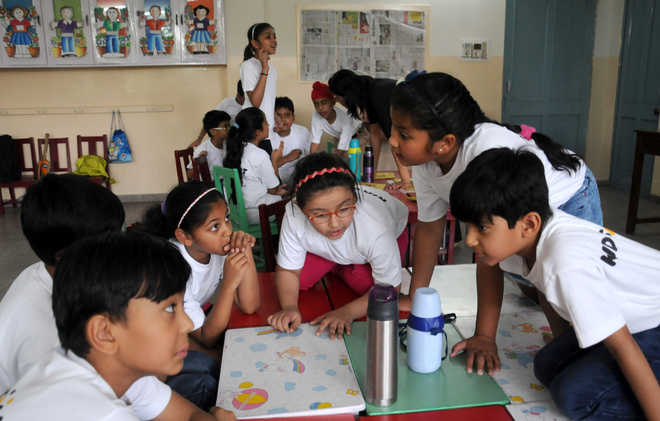Learning the fun way
Rashi Mathur
Soft skills play a vital role in the intellectual growth of a child and help adolescents adapt to the difficulties faced during transition from students to professionals at workplace. Therefore, well-informed parents are leaving no stone unturned when it comes to enrolling their wards in after-school activities. Children too show excitement to strike bond with new faces in these programmes.
Gallant and glad, students from classes I to V, have gathered to take part in KidSmart Programme at St Kabir School, Sector 26, Chandigarh. Kids from classes I to V, studying in different schools across Tricity, including the host school, Strawberry Fields, Carmel Convent and Sunshine Meadows, among others are here to participate in this after-school event to enhance their soft skills such as communication, confidence, sense of teamwork and social conduct.
Inquisitive and excited faces, they are happy to be in school in civil dress with their mini bags. They try to mingle up with other kids as the event begins. They are divided into two teams. When asked basic questions on mannerism, they exhibit strong reflexes by raising their hands if they know the answer. Some even prompt the answer, while others first discuss it among their teammates and then one of them speaks up.
“What is usually played before starting of a movie in theatres?” questions Enma, founder of the programme, while conducting a quiz that is one of the components of the session. “National Anthem,” eagerly says Shaurya, a Class III boy. However, the other team gets into a quick commotion and then team captain, Adhiraj, seeks permission to respond. “We are asked to stand straight, look erect and hum the National Anthem,” he tells everyone.
“I am learning things while having fun with my new friends. For every correct answer, our team gets one point each. We want to win,” says Shireen, a student of Class V. Students understand that they lose points for “wrong things” such as speaking out of turn, fretting when their competitors score and not giving others a chance to answer. Also, “magic words” such as sportsmanship, understanding, sharing and mutual dialogue fetch them grace marks.
The creativity and awareness of students is assessed through a role-play exercise, wherein a student who misses school asks homework from a classmate’s mother over phone.
Students attentively focus on tasks such as learning table etiquettes that involve comprehending the place setting, properly chewing the food and using fork and knife. They don’t simply imitate, they learn.
“We think our kids are talkative and easily mix up with fellow students. However, during parent-teacher meetings, we learn that their behaviour in school is completely opposite to what they are at home. Such programmes help in grooming students’ personality. They learn to face different situations,” says Namita, whose nine-year-old boy is one of the programme participants.
“I constantly nag my daughter to finish her homework, clean her room and have a timely sleep. But now, I feel delighted to see her make a to-do list,” shares Rajni, another parent. “With schools compelled to largely focus on academics, families becoming more nuclear and dual income households becoming a norm, we aim to engage maximum number of young participants in interactive, activity-filled and character-building programmes,” suggests Enma.









